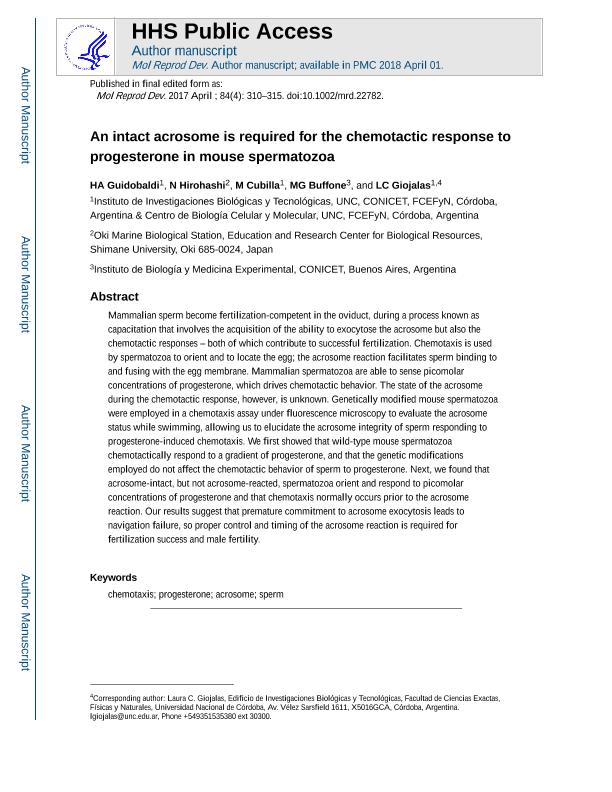Mostrar el registro sencillo del ítem
dc.contributor.author
Guidobaldi, Héctor Alejandro

dc.contributor.author
Hirohashi, Noritaka
dc.contributor.author
Cubilla, Marisa Angélica

dc.contributor.author
Buffone, Mariano Gabriel

dc.contributor.author
Giojalas, Laura Cecilia

dc.date.available
2018-11-05T22:55:06Z
dc.date.issued
2017-04
dc.identifier.citation
Guidobaldi, Héctor Alejandro; Hirohashi, Noritaka; Cubilla, Marisa Angélica; Buffone, Mariano Gabriel; Giojalas, Laura Cecilia; An intact acrosome is required for the chemotactic response to progesterone in mouse spermatozoa; Wiley-liss, Div John Wiley & Sons Inc; Molecular Reproduction and Development; 84; 4; 4-2017; 310-315
dc.identifier.issn
1040-452X
dc.identifier.uri
http://hdl.handle.net/11336/63723
dc.description.abstract
Mammalian sperm become fertilization-competent in the oviduct, during a process known as capacitation that involves the acquisition of the ability to exocytose the acrosome but also the chemotactic responses—both of which contribute to successful fertilization. Chemotaxis is used by spermatozoa to orient and to locate the egg; the acrosome reaction facilitates sperm binding to and fusing with the egg membrane. Mammalian spermatozoa are able to sense picomolar concentrations of progesterone, which drives chemotactic behavior. The state of the acrosome during the chemotactic response, however, is unknown. Genetically modified mouse spermatozoa were employed in a chemotaxis assay under fluorescence microscopy to evaluate their acrosome status while swimming, allowing us to elucidate the acrosome integrity of sperm responding to progesterone-induced chemotaxis. We first showed that wild-type mouse spermatozoa chemotactically respond to a gradient of progesterone, and that the genetic modifications employed do not affect the chemotactic behavior of sperm to progesterone. Next, we found that acrosome-intact, but not acrosome-reacted, spermatozoa orient and respond to picomolar concentrations of progesterone and that chemotaxis normally occurs prior to the acrosome reaction. Our results suggest that premature commitment to acrosome exocytosis leads to navigation failure, so proper control and timing of the acrosome reaction is required for fertilization success and male fertility.
dc.format
application/pdf
dc.language.iso
eng
dc.publisher
Wiley-liss, Div John Wiley & Sons Inc

dc.rights
info:eu-repo/semantics/openAccess
dc.rights.uri
https://creativecommons.org/licenses/by-nc-sa/2.5/ar/
dc.subject
Sperm
dc.subject
Acrosome
dc.subject
Fertilization
dc.subject
Chemotaxis
dc.subject
Progesterone
dc.subject.classification
Bioquímica y Biología Molecular

dc.subject.classification
Ciencias Biológicas

dc.subject.classification
CIENCIAS NATURALES Y EXACTAS

dc.title
An intact acrosome is required for the chemotactic response to progesterone in mouse spermatozoa
dc.type
info:eu-repo/semantics/article
dc.type
info:ar-repo/semantics/artículo
dc.type
info:eu-repo/semantics/publishedVersion
dc.date.updated
2018-10-23T15:54:26Z
dc.journal.volume
84
dc.journal.number
4
dc.journal.pagination
310-315
dc.journal.pais
Estados Unidos

dc.journal.ciudad
Nueva York
dc.description.fil
Fil: Guidobaldi, Héctor Alejandro. Consejo Nacional de Investigaciones Científicas y Técnicas. Centro Científico Tecnológico Conicet - Córdoba. Instituto de Investigaciones Biológicas y Tecnológicas. Universidad Nacional de Córdoba. Facultad de Ciencias Exactas, Físicas y Naturales. Instituto de Investigaciones Biológicas y Tecnológicas; Argentina
dc.description.fil
Fil: Hirohashi, Noritaka. Shimane University; Japón
dc.description.fil
Fil: Cubilla, Marisa Angélica. Consejo Nacional de Investigaciones Científicas y Técnicas. Centro Científico Tecnológico Conicet - Córdoba. Instituto de Investigaciones Biológicas y Tecnológicas. Universidad Nacional de Córdoba. Facultad de Ciencias Exactas, Físicas y Naturales. Instituto de Investigaciones Biológicas y Tecnológicas; Argentina
dc.description.fil
Fil: Buffone, Mariano Gabriel. Consejo Nacional de Investigaciones Científicas y Técnicas. Instituto de Biología y Medicina Experimental. Fundación de Instituto de Biología y Medicina Experimental. Instituto de Biología y Medicina Experimental; Argentina
dc.description.fil
Fil: Giojalas, Laura Cecilia. Consejo Nacional de Investigaciones Científicas y Técnicas. Centro Científico Tecnológico Conicet - Córdoba. Instituto de Investigaciones Biológicas y Tecnológicas. Universidad Nacional de Córdoba. Facultad de Ciencias Exactas, Físicas y Naturales. Instituto de Investigaciones Biológicas y Tecnológicas; Argentina
dc.journal.title
Molecular Reproduction and Development

dc.relation.alternativeid
info:eu-repo/semantics/altIdentifier/url/https://onlinelibrary.wiley.com/doi/abs/10.1002/mrd.22782
dc.relation.alternativeid
info:eu-repo/semantics/altIdentifier/doi/http://dx.doi.org/10.1002/mrd.22782
dc.relation.alternativeid
info:eu-repo/semantics/altIdentifier/pmid/28176444
Archivos asociados
